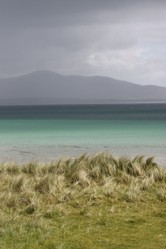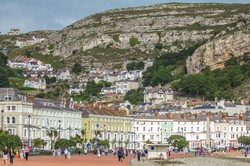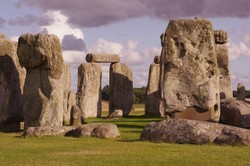He began in Shetland, negotiating the scenic Ramna Stacks and the beautiful, but narrow passage of Northmavine, pictured in the book, before travelling through the Orkney Isles, where he began on Westray before passing south, exposing the depopulation of certain isles at the hands of callous landlords. Thence he rounded Cape Wrath, the most northwesterly point in Scotland to head to the Summer Isles. From there it was not a long hop to the Isle of Lewis, where he beached to explore the Lewis cultural revival.
As kayaking off Scotland in January is suicidal he stored the kayak and walked a succession of peaks in the wilds of Assynt before resuming his trip and visiting Skye, where he did some walking and researched the Gaelic revival before going on to Islay, the stepping stone to Ireland. He was now entering some rough water. He boated along the north shore of Erin and turned south at Donegal, Then began a tricky passage south, but the strategy was the same, camp ashore at night and stop at places where he could meet figures of cultural significance.He stowed the kayak at one point and made the trip to Tory Island. There is a gap in his account of the island community's survival, for he mentions the various individuals who were instrumental in saving the community, but overlooks Father O' Peicin, who did much for the isle. This I find a serious lacuna in that part of the book.
But this one flaw does not vitiate the book, for the rest of the Irish journey is charming and filled with interesting characters, and also is replete with wild life, whales, dolphins and seabirds travel on the same path as he does, and he visits various islands with the poignant ruins of communities slowly being re-absorbed into the earth.
The next journey is through the Irish Sea from Inis Enlli [Bardsey] to the Bristol Channel. While concentrating much time and effort on Bardsey, the island of saints, he seems to emphasise culture more than the political and economic struggle which permeates Gaelic history. The islands on the Welsh leg of the journey are fewer and less welcoming, with wardens eager to charge landing fees or prohibit access.
The final leg of the voyage is down to Sennen Cove in Cornwall, and the emphasis is placed squarely on culture, with significant accounts of painters and poets.
The last leg nearly went wrong.He made a fourteen mile trip to the Seven Stones Reef,hoping to spend a last night camping there, but the whole of this ship's graveyard was foaming white and as night was falling Gange was forced to spend a whole night on water, having to stay awake.He survived the ordeal and, exhausted, paddled back to Sennen Cove. But there is significance in his ordeal. While he had enjoyed some rather good luck with weather conditions, luck can change and the sea will always win in the end.Maybe his luck had begun to run out.









 TheThousand Year Gardenon 11/26/2025
TheThousand Year Gardenon 11/26/2025
 Women of the Gospelson 10/11/2025
Women of the Gospelson 10/11/2025
 Religious Gardenson 08/25/2025
Religious Gardenson 08/25/2025
 Doctor of the Church: John Henry Newmanon 08/03/2025
Doctor of the Church: John Henry Newmanon 08/03/2025




Comments
Thank you!
The isle of Man can be described as between England and Ireland.
Do the isle inhabitants consider themselves their own culture and people or do they consider themselves close to England or to Ireland?
Tensions between London and the rest of Britain abound. They are an on going problem.
The last two sentences in your introduction advise us that "there is sustained reflection on the place of Atlantic cultures in modern urban London-centred Britain.The whole journey is the isles as seen from a small craft, as our ancestors once saw them."
Would coastal and insular United Kingdom be focused on their coastal and island activities and culture today or would they be "London-centred"?
1: Thanks Derdriu.The author does not say how he took notes, so I am as much in the dark on this matter as you are.
2: He slept on beaches, clifftops,greensward and when he could get one a hotel.In January he camped out in good winter kit.
3: Sometimes the fiercest opponents of Highland Scots were other Scots. Remember that Scotland was a coming together of different races and languages: Scots of British descent in the south of the country, who spoke either Lallands, a variety of English, or Cumbric, a relation of Welsh; in the West, Scots of Irish descent who spoke Gaelic;and in other parts of Scotland, i.e, the East and North of the Great Glen people of Pictish and Scandinavian descent, who spoke Pictish, probably a variety of a Scandinavian tongue, or Norn, a relation of Norwegian. These races were united under one dynasty by force and never really got on with each other. The English were quite villainous to the Scots, who were just as villainous to the English, and also to each other. Neither side should claim to be the good guys.
Lallands and Norn merged into English and Cumbric died out.
4: You are right about Maud's descent from Alfred, but in patrilineal systems inheritance is only reckoned through the male. The Normans took care to Mary into the Saxon royal line, as did the king of Scotland, but it was mere dynastic convenience and they still start the list of kings with William. But they got Edward the Confessor made a saint, as he was pro-Norman. Disgraceful really.
frankbeswick, Thank you for the practical information and product lines.
Does the author say anything about note-taking or recording his history-based experiences or trying not to lose them or trying to retrieve them from the waves and the wind?
There's not much that can fit into a kayak and stay dry so did he have to rustle up drink and food every day and sleep in wet bedding outdoors? Oh perhaps not, since you mention January so he must have arranged overnight accommodations along the way.
The attitude toward the Scots is strange since the French thought they were respectable enough to marry into their royal lines and since the Russians thought them intelligent and successful enough to let them establish enduring economic ties by the time of Ivan the Terrible (although it didn't stop Peter the Great from decapitating his favorite mistress, Mary Hamilton).
It's surprising about beginning English kings with the very person whose wife, Matilda, was vaunted then (through now, no?) as a direct descendant of that most Anglo-Saxon of kings, Alfred the Great.
Why not include Edward the Confessor in the list of English kings? Wasn't he the ruler that sometimes is described as the last king that everybody agrees on liking and respecting?
Yes, it is easier to be prejudiced when you are sitting in a comfortable study than when you are confronting danger.
Historians and Authors will be biased based on their perspectives, prejudices and culture impact. However, I like it that the author traveled through the many dangers of the sea before presenting the facts. His views were formed on a thoroughly researched topic, adventure and study.
He does not answer that question, but he does not mention note writing, so I presume that he wrote from memory.
Quite an experience he had. He chose the middle approach. Far less perilous would have been to experience the trip via video, if one were to exist. And a less acceptable approach would have been to take a class of students along, albeit in a larger boat, perhaps a drakkar (Viking longboat).
That would have been authentic, and would indicate heading up rivers to observe the people who live along them.
One curiosity is did he record as he went, or remember and write things observed later when he was not being tossed about by the sea?
Frank
This is an excellent piece thank you. Orkney and Shetland are places I would love to visit one day.